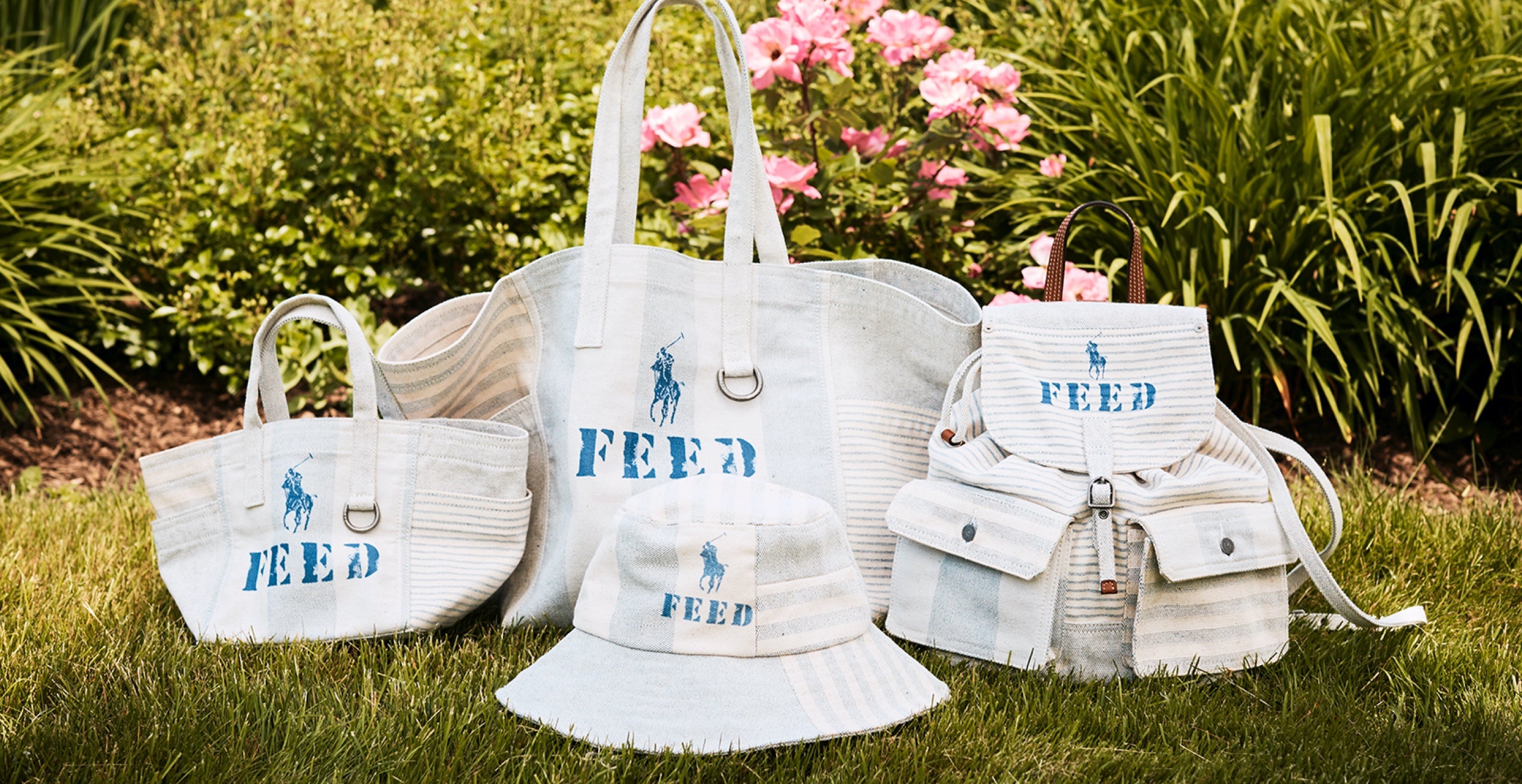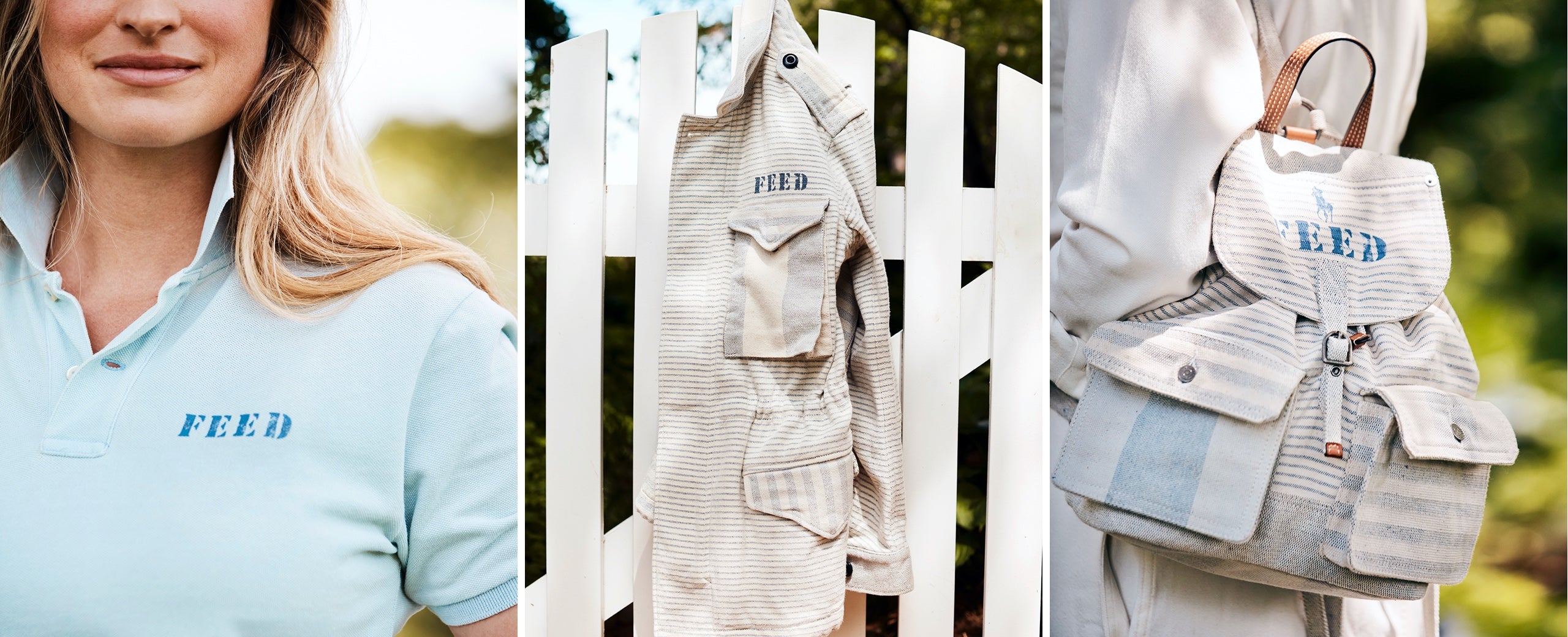
Come Together
In a time of unprecedented need, FEED founder Lauren Bush Lauren brings sustainability to the forefront in a second Polo capsule collaborationAs a junior at Princeton, Lauren Bush Lauren was inspired to launch FEED after seeing tragic levels of food disparity firsthand on trips with the United Nations World Food Programme. The brand’s first product was a reusable burlap bag with a measurable, transparent donation that would go toward providing school meals. Fourteen years later, those numbers have reached into the millions, with FEED having helped provide more than 120 million meals to kids in need through its nonprofit partners. This year, for her latest endeavor, Bush Lauren collaborated for the second time with Polo on a capsule of seven pieces—from a backpack to a bucket hat—that embodies an iconic blue-and-white Polo sensibility and a uniquely FEED ethos. On the eve of the launch, we sat down with Bush Lauren to talk about what she’s learned partnering with Polo for a second time, FEED’s work during the COVID-19 pandemic, and why sustainability and teamwork are more important than ever.

FEED first collaborated with Polo on a capsule of four pieces in 2019. What has the process of working together on this second collection been like?
We almost doubled the number of pieces from 2019, and this year we added apparel, which is really cool. The first time, we went more heritage FEED—the burlap inspiration and the original FEED bag were our North Star. This time, knowing we wanted to do something for summer, we used whites, blues, and cottons as a starting point. We started with bags, of course, because that’s what FEED is most known for. But from the beginning, we were thinking about other pieces. We included a leather baseball hat in 2019 that did really well and made us realize that there could be an appetite outside of bags. After talking to Ralph, we added the bucket hat and the military jacket. The jacket really came from his suggestion to do a fresh take on an iconic Polo piece by making it in white and indigo. It’s a classic unisex item but also kind of avant-garde and very wearable.
How did you end up partnering with the sustainable textile manufacturer The New Denim Project? That’s such an exciting group to be working with.
A good friend of mine had discovered The New Denim Project on a giving trip with Every Mother’s House to Guatemala. When she came back, knowing that we are always working to be a little more sustainable in terms of our sourcing, she suggested them as someone we should look into. We reached out and got their swatch book and were thinking of ways to incorporate the fabrics in our line. About a week later, we had our design kick-off meeting with Polo, and in that meeting was also the swatch book! It was a very synergistic “ah-ha” moment. Here both teams had independently discovered The New Denim Project and had become enamored with their mission.
What is it about their approach and philosophy that really pulled you in?
It’s a business on a mission and it’s women-founded. We love aligning with those type of folks. The New Denim Project fabrics are all upcycled from cutting room floors and factories. Their mission is a closed-loop production process that eliminates waste so it very much fits in with what our product development priorities are. We decided to go with them for the bags, the military jacket, and the hat. The swatches we saw were all natural cottons and indigos in a range of stripes. Seeing a mix of the different stripes and patterns together was actually where the idea to include the laundry bag—a shape that Polo has done before and is known for—came from. As the world transitioned to working remotely, the designers had to get all of the samples sent to their apartments and houses and take pictures. It was definitely a new day in terms of the design process, but we’re really thrilled with how things turned out!

Sustainability is so important to both FEED and Polo. Tell me a bit more about that as it relates to FEED’s wider philosophy and this collaboration specifically.
Sustainability has definitely always been top of mind, but it has grown in urgency for us. We have been doing a deep dive in terms of evaluating everything from our packaging to our dye process and fabrication, really trying to look at every part of the supply team to see where and how we can be more environmentally friendly and sustainable.
With our bags and accessories, we only use natural materials. Our bags are even lined with recycled plastic. When we can, we try to only use cotton and leather, and have made a lot of progress in terms of creating pieces that are GOTS-certified and use natural dyes. Obviously, the main mission of the collection and FEED is to help provide school meals for kids in America. But a layer beneath that is about making products as mindfully and as sustainably as possible. It would be strange to set out to do something good for the world and not keep that in mind. And Polo has been, of course, doing that too for many years. For the Polo shirt, for example, we utilized a natural indigo dye process, which honestly was hard to get right for a little bit, but ultimately it’s so rewarding. It’s wonderful to be able to learn from a bigger company like Ralph Lauren, which has a much more robust team and sophisticated sourcing pipeline.

Switching gears a little bit. This has been a really hard year for women and children who have been disproportionately affected by the COVID-19 pandemic. What have the past 15 months been like for FEED in light of the significant food crisis and school closures?
This year has definitely reinforced, unfortunately, the need for FEED and for our giving partners who are doing great work globally but also here in the US. If you take just one stat, from April of last year, more than one in five households in the US were food insecure. That’s a staggering number, and definitely up from pre-COVID times. We were all heartbroken to see those massive lines of cars waiting to get groceries. Thankfully, we’re getting out of this, but it’s not like the issue is going to go away immediately given how many people lost their jobs and were already living paycheck-to-paycheck. It’s going to take a bit to rebound from this.
Obviously, in a pandemic, you can’t distribute food the way you normally would. Globally and in the US, schools are one of the best safety nets we have to ensure that kids, at the very least, are getting one meal per day. The giving partner that the Polo x FEED collaboration benefits is our US giving partner, No Kid Hungry. In normal times they support kids in need by helping implement and fund free or reduced-price lunches, as well as breakfast, supper, and even summer meals. During the pandemic, they transitioned to giving millions of dollars to different local organizations that were basically stepping in when the schools were shuttered and helped to establish food pick-up locations for kids and their families. On a smaller scale, FEED looked to raise additional funds quickly by making local feed-and-receive bags and bandannas that gave back to different cities and food banks across the country.

As a female CEO and a mom, the year must have been like no other in terms of recalibrating and rebalancing to make things work.
I’m so proud of my team for how we all adapted. It really saddens me to see the statistics about how many women essentially have had to drop out of the workforce in order to care for their families and handle homeschooling. I think all working moms have experienced setbacks and frustrations during this time. At FEED, we’re a team of all women right now. We have a familial feel, given our size and how long many of us have worked together, which is just great. But the fact that for all the progress women have made and are making and were making, that there has been this huge setback really breaks my heart. Hopefully it’s not permanent and everyone can get back to work and rebound, but so much is still unknown and really difficult.
How has this impacted your vision for FEED?
I think it reinforced, if anything, our mission and why food security is an issue and hunger needs to be addressed. Knowing that so many more people, especially kids, globally are in a situation in which their next meal isn’t guaranteed motivates us to keep doing what we’re doing. The issue of hunger gets political, but it shouldn’t be. It needs to just be one of those things we can all align on and really try to do something about.
It must feel extra special to be able to work with family at a time like this. What do you hope people in general can take away from the year we’ve been through?
On a personal level, I’m so excited now that everyone is getting vaccinated and there’s a level of comfort to doing something as simple as giving someone a hug. I’m so grateful and obviously such a fan of Ralph and what he’s built. It’s definitely a dream come true to work with such an iconic brand that does such good and truly stands for family values. In terms of the big picture, I think we’re all coming out of this moment more conscious and hopefully more aware and active in wanting to be good citizens and good neighbors. Consumers who weren’t already on the bandwagon have now shifted further to wanting to make sure that their dollars really matter and they should be putting them toward purchases that help our fellow Americans in need, whenever possible.






